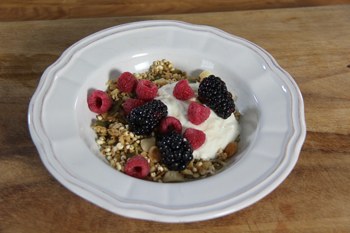Is Gluten Free Eating Into Your Budget?

Is Gluten Free Eating Into Your Budget?
If you've switched to gluten free eating recently, you may fear that your money saving days for groceries are over. Truth is, many of the same cost-cutting principles for standard groceries can be applied to gluten free eating.
First, it's important to understand whether you really need to avoid gluten-containing foods. A simple point of care finger prick screening test offered at Amcal+ Pharmacies nationwide can detect your risk of coeliac disease before further diagnostic testing is performed by your GP.
Check out this Amcal recipe for Buckwheat Granola
Omitting gluten may mean making unnecessary changes to the diet, but if you are diagnosed with coeliac disease or non-coeliac gluten sensitivity, take head of nutritionist Kathleen Alleaume's advice for gluten free eating on a budget.
1. Go the whole way
Avoid buying packaged gluten-free products and make whole foods the focus of your meals and snacks as much as possible. While supermarkets and restaurants are responding to the growing need for more gluten-free options, the cost of these specialised foods and ingredients is often significantly higher. Opt for naturally gluten-free foods such as fresh fruit and vegetables, lean meat, tofu, fish, legumes, dairy, nuts and eggs.
2. Make a plan
This tip is relevant to everyone regardless of their diet. Planning your meals for the week ahead and writing a shopping list with all of the ingredients required will help you budget and use your groceries efficiently by reducing both waste and expensive dashes to the supermarket for last-minute purchases.
3. Eat seasonally
By tailoring your weekly meal plan to match in-season fruit and veg you'll not only save dollars, but you'll also reap health benefits as produce harvested in season is often more nutritious, not to mention tasty! Try stone fruits, pomegranates, cauliflower and broccoli which are at their peak during the autumn months.
4. Be label wise
Many packaged gluten free foods contain hidden sugars, added fats, additives, are lower in fibre, and may lack the fortification of extra vitamins and minerals that you may find in a regular gluten-containing diet. Remember, just because gluten free foods are located in the health food aisle, it doesn't necessarily make them healthier!
Cooking tonight's dinner? Make double the amount and use the leftovers for lunch the next day or pop in the freezer for a later time. I like to make a large batch of quinoa or brown rice, which keeps in a resealable bag in the freezer for about a month. Defrost in the microwave and use however you please.
6. Keep it simple
While ancient grains, including quinoa, buckwheat and amaranth are all the rage, there's nothing wrong with sticking to the more basic options such as corn or brown rice which are cheaper, yet still full of fibre keeping you feeling fuller for longer and helping with normal digestion.
7. Meat alternatives
If you find meat to be quite expensive, look towards meat-free alternatives like legumes (e.g chickpeas and lentils), beans and pulses, which provide a valuable and cost effective source of protein, iron, some essential fatty acids and fibre. Research shows that a diet of predominantly plants is the healthiest diet for us all, including for the longevity of a healthy planet. Meatless Monday anyone?
Those concerned about gluten sensitivities and experiencing symptoms such as digestive issues (diarrhea, stomach cramps, bloating, constipation), lethargy, irritability or headaches, may wish to consider a free digestive health check available at Amcal+ stores during March, or a coeliac disease screening test at selected Amcal+ stores nationwide for $39.99.
MORE



